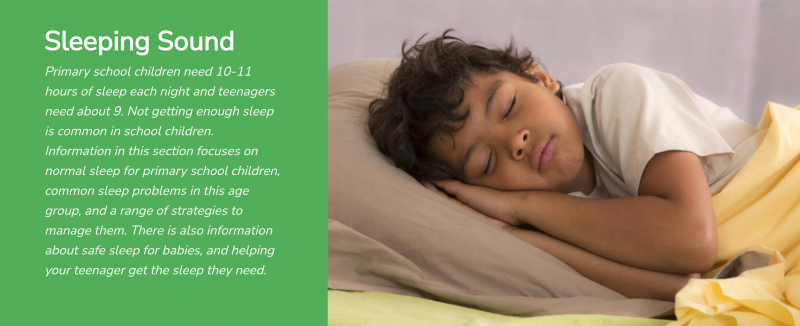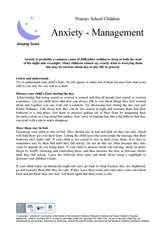Sleep & Anxiety
Sleep & Anxiety
Anxiety is probably a common cause of difficulties settling to sleep at both the start of the night and overnight. Find out about strategies you can use to help your child.
Key points about sleep and anxiety
- anxiety is probably a common cause of difficulties settling to sleep at both the start of the night and overnight
- you can help by trying to understand your child's fears
- acknowledge that being scared or worried is normal and that all people feel scared or worried sometimes
- avoid scary TV shows, including the news or videos, or stories that may add to your child's fears
- teach your child skills to get over their fears
- teaching your child to relax can help them to fall asleep at bedtime
This page is about sleep in primary school children. It's part of a whole section on sleeping sound.
How can anxiety affect my child's sleep?
Anxiety is probably a common cause of difficulties settling to sleep at both the start of the night and overnight. Many children cannot say exactly what is worrying them but may be anxious about day-to-day life in general.
Should I try to understand my child's fears?
Try to understand your child's fears. Do not ignore or make fun of them because fears that seem silly to you may be very real to a child.
When is the best time to discuss my child's fears?
Acknowledge that being scared or worried is normal and that all people feel scared or worried sometimes. Let your child know that they can always talk to you about things they feel worried about and together you can work out a solution. Try discussing fear during the day (not just before bedtime). Talk about how they can be less scared at night and reassure them that their bedroom is a safe place. Get them to practice getting rid of their fears by imagining their favourite colour as a big cloud that pushes 'fear' away or making fear into a big balloon that they can prick with a pin to make disappear.
Should I let my child get out of bed if they are scared?
Let your child know that they can always talk to you about things they feel worried about and together you can work out a solution.
Encourage your child to stay in bed. They should stay in bed and find out they are safe, which will help them get over their fears. Letting your child leave the room sends the message that their bedroom isn't really safe. If your child is too scared to stay in their room alone, it is OK to sometimes stay by their bed until they fall asleep. Do not do this too often because they may come to depend on you being there. If your child is anxious about you leaving, check on them. Begin by briefly checking and comforting them, and then increase the time in between checks until they fall asleep. Leave the bedroom door open and think about using a nightlight to decrease your child's fears.
If your child wakes up during the night and can't go back to sleep because they are frightened, go and reassure them that they are safe. If they leave their room and come into yours, take them back and put them back into bed. Tell them again that their room is safe.
How can I comfort my child when they are scared?
It is important to comfort children who are scared. When your child holds onto you as they are being tucked in, or calls out in fear, you should go back to their bed and find out what is wrong. Be sure to tell them that they are safe.
You could say something like this:
"You are safe; we are here to make sure you stay safe."
How can I teach my child to get over their fears?
Teach your child skills to get over their fears. For example:
- discuss ways to respond to nighttime fears, such as by 'being brave' and thinking positive thoughts (for example, 'monsters are just pretend')
- tell your child how you deal with something that frightens you
You can also try reading stories about children who are afraid and conquer their fears.
For example, for younger kids:
- 'David and the worry beast: Helping children cope with anxiety' by Anne Marie Guanci (illustrated by Caroline Attia)
- 'The huge bag of worries' by Virginia Ironside (illustrated by Frank Rodgers)
For older kids:
- 'Mind your mind' by Leigh Hay and Julie Johansen
- 'What to do when you're scared and worried' by James J. Crist
Should I introduce a security object to help my child's fears?
Help your child become attached to a security object like a toy or blanket. They can keep this in bed with them to help them feel more relaxed during the night.
Can scary television shows make my child anxious?
Avoid scary TV shows, including the news or videos, or stories that may add to your child's fears. Avoid talking about their worries just before bedtime.
How can I help my anxious child to relax?
Teaching your child to relax can help them to fall asleep at bedtime. Below are some ideas of how to do this. Giving them something else to think about while lying in bed can help to distract them from their fearful thoughts. Remember, it is impossible to be relaxed and scared at the same time!
Relaxation ideas for your child include the following.
Muscle exercises
Ask your child to lie down with their eyes closed and then get them to tighten and relax all the muscles of their body, one after the other. Some children find it helps to do these muscle exercises whilst thinking about their favourite relaxing place, such as the beach, a park or granny's backyard.
Imagining clouds
Ask your child to close their eyes and think about a cloud pushing away the fear.
Drawing a picture
Ask them to draw a picture of their fear and then put it away in a 'scary thoughts' box for the night.
Should I reward my child for staying in bed and being brave?
A reward chart for trying to be brave can be helpful. At first, this may be for not getting out of bed and just calling out if they really feel they need you. Then later, as your child feels safer, you can reward them for staying in bed all night and not calling out.
Reward and praise your child as soon as they wake up in the morning 'for knowing that their bedroom is a safe place to be' and remind them they can always talk to you when they feel worried. The reward should be something small and could involve collecting a certain number of stickers leading to a reward your child will enjoy (such as a lucky dip prize, trip to the park). This will vary depending on the age of your child. The reward should be easy to achieve for your child to begin with to increase the chance of your child being able to succeed.
See more KidsHealth content on sleeping sound
This page last reviewed 16 March 2023.
Do you have any feedback for KidsHealth?
If you have any feedback about the KidsHealth website, or have a suggestion for new content, please get in touch with us.
Email us now

